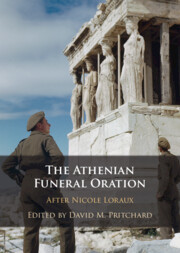Book contents
- The Athenian Funeral Oration
- The Athenian Funeral Oration
- Copyright page
- Contents
- Figures and Tables
- Contributors
- Foreword
- Preface
- Abbreviations
- 1 The Funeral Oration after Loraux
- Part I Contexts
- Part II The Historical Speeches
- Part III The Literary Examples
- Part IV Intertextuality
- 12 Imagining Athens in the Assembly
- 13 Fighting Talk: War’s Human Cost in Drama and Law-Court Speeches
- 14 Making Athens Great Again: Tragedy and the Funeral Oration
- 15 Euripides’ Erechtheus and the Athenian Catalogue of Exploits: How a Tragic Plot Shaped the Funeral Oration
- 16 ‘Back Then When the Barbarians Came’: Old Comedy and the Funeral Oration
- Part V The Language of Democracy
- References
- General Index
- Index of Sources
16 - ‘Back Then When the Barbarians Came’: Old Comedy and the Funeral Oration
from Part IV - Intertextuality
Published online by Cambridge University Press: 11 January 2024
- The Athenian Funeral Oration
- The Athenian Funeral Oration
- Copyright page
- Contents
- Figures and Tables
- Contributors
- Foreword
- Preface
- Abbreviations
- 1 The Funeral Oration after Loraux
- Part I Contexts
- Part II The Historical Speeches
- Part III The Literary Examples
- Part IV Intertextuality
- 12 Imagining Athens in the Assembly
- 13 Fighting Talk: War’s Human Cost in Drama and Law-Court Speeches
- 14 Making Athens Great Again: Tragedy and the Funeral Oration
- 15 Euripides’ Erechtheus and the Athenian Catalogue of Exploits: How a Tragic Plot Shaped the Funeral Oration
- 16 ‘Back Then When the Barbarians Came’: Old Comedy and the Funeral Oration
- Part V The Language of Democracy
- References
- General Index
- Index of Sources
Summary
A striking feature of old comedy is its cannibalising of contemporaneous Athenian literature. The comic poets integrated the funeral oration into their comedies in three ways. Their first way was to bring on stage the funeral oration’s ancestors. Aristophanes characterised his choruses as such in three of his surviving plays. When these ancestors came to praise their own military exploits, they used the same terms as the funeral speeches and privileged the same historical period: the Persian Wars. Aristophanes clearly used this characterisation of the chorus for the sake of persuasion. By having these proud old men support the effort of a comic protagonist to bring peace, he defused the criticism that this effort went against the martial reputation of the Athenian people. The second way in which old comedy integrated the funeral oration was to warn theatregoers about the general dangers of praise. While Aristophanes sometimes quoted praise from dithyrambs as an example of what public speakers said in order to deceive the people, at other times, Aristophanes quoted from funeral speeches. The third way in which comedy engaged with the funeral oration was the deliberate confounding of the epitaphic genre’s characterisation of the Athenians as selfless and courageous.
- Type
- Chapter
- Information
- The Athenian Funeral OrationAfter Nicole Loraux, pp. 339 - 354Publisher: Cambridge University PressPrint publication year: 2024

